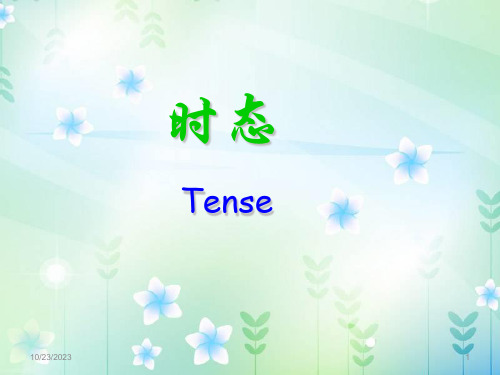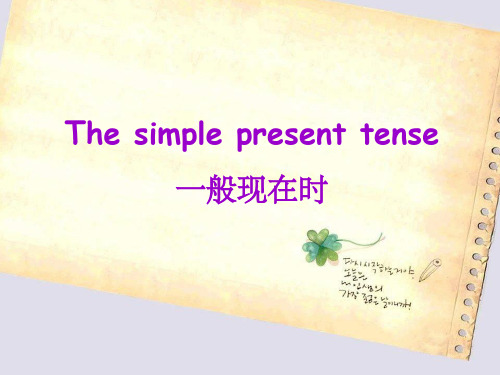一般现在时英语讲解ppt课件
合集下载
英语时态8种基本时态讲解.ppt课件

4)动词过去式变化规则。 a)一般情况下的词加-ed. work---worked call----called b)以不发音的字母e结尾的单词直接加-d . live----lived change----changed smoke----smoked die----died graduate----graduated drive----drove
8.过去完成时 表示动作发生在过去某一时间之前已经完成的动作或状态, 强调“过去的过去”, 常与 by the time, by the end of…,before , by 等引导时间的状语连用。
基本结构 主语+ had + 动词过去分词 + 其他成分 When I got to the cinema yesterday the film had begun already. He had learned English before he came here.
现在完成时与一般过去时的区别: 1)现在完成时侧重于对现在的影响;而一般过去时侧重于某一动作发生在过去某个时间或某段时间。即现在完成时侧重于现在的结果,而一般过去时侧重于动作发生的时间。例如:
I have seen the film. 我看过这部电影。(现在我仍记得电影的内容) I saw the film three days ago. 三天前我看了这部电影。(强调是三天前,而不是别的什么时候看的电影)
be going to含有“打算,准备”的意思,而will则没有这个意思, She is going to lend us her book. He will be here in half an hour.
be about to+V.原形(意为马上做某事,在时间上指最近的将来) I am about to leave school. 不能与表示时间的副词连用。 They are about to set out.(√) They are about to set,变y为i加-ed. study----studied carry----carried cry----cried try----tried d)以元音字母+y结尾的单词直接加-ed. play----played stay----stayed
8.过去完成时 表示动作发生在过去某一时间之前已经完成的动作或状态, 强调“过去的过去”, 常与 by the time, by the end of…,before , by 等引导时间的状语连用。
基本结构 主语+ had + 动词过去分词 + 其他成分 When I got to the cinema yesterday the film had begun already. He had learned English before he came here.
现在完成时与一般过去时的区别: 1)现在完成时侧重于对现在的影响;而一般过去时侧重于某一动作发生在过去某个时间或某段时间。即现在完成时侧重于现在的结果,而一般过去时侧重于动作发生的时间。例如:
I have seen the film. 我看过这部电影。(现在我仍记得电影的内容) I saw the film three days ago. 三天前我看了这部电影。(强调是三天前,而不是别的什么时候看的电影)
be going to含有“打算,准备”的意思,而will则没有这个意思, She is going to lend us her book. He will be here in half an hour.
be about to+V.原形(意为马上做某事,在时间上指最近的将来) I am about to leave school. 不能与表示时间的副词连用。 They are about to set out.(√) They are about to set,变y为i加-ed. study----studied carry----carried cry----cried try----tried d)以元音字母+y结尾的单词直接加-ed. play----played stay----stayed
八大时态讲解(共26张PPT)

He is going to buy her some flowers.
0 一般过去将来时:
He was sixty-eight. In two years he would be seventy.
I knew you would agree.
0 现在英进行语时的: 动词时态(进行) What are you doing?
算;
如:I am going to listen to music. (我打算听音乐) will /shall 表示未事先思考或为计划过的意图
如:It will be Christmas soon .(很快就圣诞节了)
4. 现在进行时态( The Present Continuous Tense )
5、我们离开广州六年了。
We have left Guangzhou for 6 years . ×
We have been away from Guangzhou for 6
years .
3.常见句型
1) 主句(现在完成时)+since 从句(一般过去时).
2) It is +一段时间+ since 从句(一般过去时).
has gone to
He said had seen this morning, …ago, etc
that he _________the film many 如果明天不下雨,我们将去野营。
He has borrowed the pen for three days .
times. 现在进行时态( The Present Continuous Tense )
was /were going to +动词原形
0 一般过去将来时:
He was sixty-eight. In two years he would be seventy.
I knew you would agree.
0 现在英进行语时的: 动词时态(进行) What are you doing?
算;
如:I am going to listen to music. (我打算听音乐) will /shall 表示未事先思考或为计划过的意图
如:It will be Christmas soon .(很快就圣诞节了)
4. 现在进行时态( The Present Continuous Tense )
5、我们离开广州六年了。
We have left Guangzhou for 6 years . ×
We have been away from Guangzhou for 6
years .
3.常见句型
1) 主句(现在完成时)+since 从句(一般过去时).
2) It is +一段时间+ since 从句(一般过去时).
has gone to
He said had seen this morning, …ago, etc
that he _________the film many 如果明天不下雨,我们将去野营。
He has borrowed the pen for three days .
times. 现在进行时态( The Present Continuous Tense )
was /were going to +动词原形
一般现在时ppt课件完整版

不可数名词作主语时,谓语动词用单数 形式。
可数名词单数作主语时,谓语动词也用 单数形式。
例如:Water is essential for life.(水 对生命至关重要。)/ A book is on the table.(一本书在桌子上。)
例外情况总结
当主语为并列主语时,谓语动词的数要与靠近它的主语保持一致。
练习3答案
reads。解析:主语 She 是第三人称单数 ,且时间状语为 on weekends,表示经 常性动作,所以谓语动词要用单数形式 reads。
THANKS
时间状语分类及举例
表示经常性或习惯性的动作
always, usually, often, sometimes
表示现在的状态或特征
now, at present, these days
表示普遍真理或客观事实
in general, as a rule
频率副词分类及举例
01
高频副词
always, constantly, continually
注意区分完全否定和部分否定。完全 否定表示全部否定,而部分否定表示 部分否定。例如,“None of the students passed the exam.”(没 有一个学生通过了考试)是完全否定 ;“Not all of the students passed the exam.”(并非所有学生都通过 了考试)是部分否定。
does he work?等。
动词短语和情态动词的变化规则
03
动词短语中的动词和情态动词后接动词原形,如I can swim,
they often go out等。
02 肯定句结构与用法
主语+动词原形+其他成分
初中英语一般现在时动词用法课件ppt(36张)

2 一般性的事实或者真理。
The sun rise in the east. 太阳从东方升起 The earth is round. 地球是圆的。
-What do you do?
-What do you do?
-I ...
- I ...
-What do I do?
-What do you do?
I go to school every day.
I do my homework every day.
I go to bed at 9:00.
二、实义动词
Know-point 2
1、实义动词的概念 实义动词,即行为动词,表示动作的动词。
I play basketball.
She wears a beautiful skirt.
三、动词的第三人称单数形式变化规则
1、一般由动词原形加-s walk-walks write-writes like-likes
写出下列词汇的第三人称单数形式:
talk say
______ ______
look __, sh结尾的动词加-es wash- washes watch-watches finish- finishes
—Do you eat every morning? —Yes, I do./No, I don't.
—Does she have a little brother? —Yes, she does./No, she doesn't.
翻译下列句子并作肯定否定回答
1 你们喜欢打篮球吗? 2 他在9点前睡觉吗? 3 Mary 是美国人吗?
It is a dog.
They are scientists.
初中英语语法之 一般现在时 PPT课件 图文

2.用括号内动词的适当形式填空。 1. We often_______(play) in the playground. 2. He _______(get) up at six o’clock. 3.____you______(brush) your teeth every morning. 4. What______ (do) he usually____ (do) after school? 5.Danny_______(study)English, Chinese, Maths, Science and Art at school.
How old _a_r_eyou? Where a_r_e_ they ?
小结:be 动词的一般现在时的句式: 肯定句:主语+be+表语(n., adj.等)
否定句:主语+be+ not+表语.
一般疑问句:Be+主语+表语?
特殊疑问句:疑问词+be+主语?
2.实义动词的一般现在时句式: 肯定句: 主语(非三单)+v.原形+其他. 1) I _s_ta_y___ (stay) at home on Saturdays. 2) They h__a_v_e_ (have) sports every day. 3) My parents _g_iv_e_(give) me ten yuan
What _d_o_e_s_ she_w_a_n_t_ (want)? What time _d_o_you_h_a_v_e_ (have) lunch? What time d_o_e_s_she_h_a_v_e(have) lunch?
What _d_o__ you _d_o_(do)? What _d_o_e_s__ she _d_o__(do)? How __d_o_ you_sp__el_l (spell) it? How _d_o_e_s_ he s_p_e_l_l _(spell) it?
初中英语语法—时态(28张) PPT课件 图文

(4)现在完成时与表示一段时间的for短语、since短语或从句等 时,应注意句中的谓语动词须是延续性的,而不能是非延续性动词,如 come→be here,go→be there,die→be dead,borrow→keep,buy→h ,join→be in,leave→be away,begin to study→study等。
6.过去进行时
(1)概念:表示过去某一时刻或某一时间段内正在进行的动作。 (2)构成形式:was/were+动词的-ing形式 ①表示往返、位移的动词的过去进行时常可用来表示过去将来时
时态 We wanted to tell her that the train was_leaving an hour later.
1.一般现在时
基本用法: (1)表示经常性、习惯性的动作; He always helps others. 他总是帮助别人。
时态 (2)表示现在的情况或状态;
He is a teacher. 他是个老师。 (3)表示客观事实和普遍真理。 The sun rises in the east. 太阳从东边升起。 构成形式:am/is/are或实义动词的原形(主语是第三人称单数时,动 词要用第三人称单数形式)。
时态 (2)构成形式:have/has+动词的过去分词。
(3)与现在完成时连用的时间状语有for a long time,recently,yet, lately,ever,never,already,since,by this time,before,just,in t past/last few years,since+过去的时间点,since+时间段+ago,since +从句(一般过去时)。
表示感觉的动词。如:see,hear等。 表示喜欢或厌恶的动词。如:like,love等。 表示希望的动词。如:want,would like等。
16种英语时态讲解PPT课件

10/23/2023
8
五、现在进行时态
现在进行时的基本用法
形式: am/is/are + doing
用法1: 表示说话此刻动作正在进行.
• He is not available now. he is talking on the phone.
• Please don’t make so much noise. I am studying.
时态
Tense
10/23/2023
1
一、时态概述
16种时态 一般动作
现在 一般现在
过去 一般过去
进行动作 现在进行 过去进行
完成动作 现在完成 过去完成
完成进行动 现在完成
作
进行
过去完成 进行
将来 一般将来 将来进行 将来完成 将来完成
进行
过去将来 一般过去将来 过去将来进行 过去将来完成 过去将来完成
此用法常与一些表示动作频率的时间副词连用(副词放在be动词之 后, 实义动词之前).
1) 表示肯定的频率副词: always, frequently, usually, sometimes, often, occasionally, generally 等.
2) 表示否定的频率副词: never, seldom, rarely 等.
10/23/2023
6
四、一般将来时态
一般将来时的基本用法
形式:
will do 或be going to do
用法1: 表示预测将要发生某事,用will或be going to do.
1) be going to 特别意指根据目前的明显迹象来推断某件事 要发生; will 则只是表名说话人认为或相信某件事要发生
初中英语一般现在时学习课件(共25张ppt)

Watch TV
I often ( ) TV at 8:00.
my father and I go swimming every sunday
My father and I ( ) swimming every Sunday
we play football every Wednesday
We ( ) football every Wednesday.
•9、要学生做的事,教职员躬亲共做;要学生学的知识,教职员躬亲共学;要学生守的规则,教职员躬亲共守。2021/8/312021/8/31Tuesday, August 31, 2021 •10、阅读一切好书如同和过去最杰出的人谈话。2021/8/312021/8/312021/8/318/31/2021 7:50:25 AM •11、只有让学生不把全部时间都用在学习上,而留下许多自由支配的时间,他才能顺利地学习……(这)是教育过程的逻辑。2021/8/312021/8/312021/8/31Aug-2131-Aug-21 •12、要记住,你不仅是教课的教师,也是学生的教育者,生活的导师和道德的引路人。2021/8/312021/8/312021/8/31Tuesday, August 31, 2021
• You have to believe in yourself. That's the secret of success. 人必须相信自己,这是成功的秘诀。
•
Exercise
• 8.I ( ) a boy. • 9.You ( ) a girl. • 10.He ( ) a teacher.
Homework(家庭作业)
1.将所学内容重新看一遍。 2.当一回小老师,给爸爸妈妈讲解什 么是一般现在时。Fra bibliotek是辅音字母
初中英语八大时态总结ppt课件

was/ were +ing。
have/ has + ed。
had + ed。
10
一般现在时 一般现在时,在没有be动词和助动词have,has,
或情态动词的情况下,要变为否定句或疑问句 的时候要借用助动词do或者does。
肯: I work here.
否: I don’t work here.
问:Do you work here?
问:Were you working here?
答:Yes, I was./ No, I wasn’t.
最新版整理ppt
16
现在完成时
肯: I have worked here.
否:I have not worked here. 问:Have you worked here?
答:Yes, I have./ No, I haven’t.
2
一般过去时
含义:过去发生的动 作或事情。例如:我 过去在这工作、我见 过她、我吃了一个苹 果。
最新版整理ppt
3
一般将来时
含义:将来要发生的动 作或状态。 例如:我
将在这工作、我将与她 见面、我将吃掉一个苹 果。
最新版整理ppt
4
一般过去将来时
含义:站在过去谈论将 要发生的事情。 例如:
一个月以前我说过,我 将要来长沙工作。 两个
现在进行时
肯: I am working here.
否:I am not working here.
问:Are you working here?
答:Yes, I am./ No, I am not.
最新版整理ppt
15
过去进行时
肯: I was working here. 否:I was not working here.
have/ has + ed。
had + ed。
10
一般现在时 一般现在时,在没有be动词和助动词have,has,
或情态动词的情况下,要变为否定句或疑问句 的时候要借用助动词do或者does。
肯: I work here.
否: I don’t work here.
问:Do you work here?
问:Were you working here?
答:Yes, I was./ No, I wasn’t.
最新版整理ppt
16
现在完成时
肯: I have worked here.
否:I have not worked here. 问:Have you worked here?
答:Yes, I have./ No, I haven’t.
2
一般过去时
含义:过去发生的动 作或事情。例如:我 过去在这工作、我见 过她、我吃了一个苹 果。
最新版整理ppt
3
一般将来时
含义:将来要发生的动 作或状态。 例如:我
将在这工作、我将与她 见面、我将吃掉一个苹 果。
最新版整理ppt
4
一般过去将来时
含义:站在过去谈论将 要发生的事情。 例如:
一个月以前我说过,我 将要来长沙工作。 两个
现在进行时
肯: I am working here.
否:I am not working here.
问:Are you working here?
答:Yes, I am./ No, I am not.
最新版整理ppt
15
过去进行时
肯: I was working here. 否:I was not working here.
人教版初中英语七年级上册第四单元《一般现在时》语法教学PPT课件

肯定变否定,be后加not
01 概念与用法
一般疑问句结构变化
Are you a good person? Is she/he a good person.
肯定句变一般疑问句,只需将 be动词提前
行为动词 的一般现在时是怎么构成的呢?
01 概念与用法
观察下列句子
1、I play football every day . 2、You play football every day . 3、My friends play football every day . 4、He plays football every day . 5、Tom plays football every day . 6、My brother plays football every day .
01 概念与用法
第三人称单数变化规则
一般动词后加-s。 like--likes He likes playing basketball.
以辅音字母+y结尾的单词, 变y为i,再加-es。 study--studies He studies English very hard.
以s、x、ch、sh结尾,后加es。 watch--watches My father watches TV every night.
Part. five
课后作业
改错题 1.Our English doesn’t likes music. 2. Tony goes always to school at eight o’clock. 3. Does your parents like watching TV? 4. Lily haves lunch at school. 5. My sister doesn’t her homework every .
01 概念与用法
一般疑问句结构变化
Are you a good person? Is she/he a good person.
肯定句变一般疑问句,只需将 be动词提前
行为动词 的一般现在时是怎么构成的呢?
01 概念与用法
观察下列句子
1、I play football every day . 2、You play football every day . 3、My friends play football every day . 4、He plays football every day . 5、Tom plays football every day . 6、My brother plays football every day .
01 概念与用法
第三人称单数变化规则
一般动词后加-s。 like--likes He likes playing basketball.
以辅音字母+y结尾的单词, 变y为i,再加-es。 study--studies He studies English very hard.
以s、x、ch、sh结尾,后加es。 watch--watches My father watches TV every night.
Part. five
课后作业
改错题 1.Our English doesn’t likes music. 2. Tony goes always to school at eight o’clock. 3. Does your parents like watching TV? 4. Lily haves lunch at school. 5. My sister doesn’t her homework every .
小学英语一般现在时-(演示)ppt课件

.
一般现在时
一般现在时 --表示经常或习惯性的动作 --表示现在的状态或主语具备的性格和能力等。
与频率副词usually ,often, sometimes ,always 和时间短语in the morning /afternoon/evening, at noon/night , every day /week /year /month 连用
如:plays, says 5、辅音字母+y结尾的单词,
去y,加ies, 如:worries, studies .
一般现在时
(否定句)
A:否定句在be动词和情态动词后加not。
例如 B:句中没有be动词或情态动词时,主语为第三人 称单数的否定句在动词前加does not (doesn’t), 非单三时,否定句在动词前加do not(don’t)
She is often late for school.
2. 表示表示客观事实
You are 13. He is a student.
You study at Olympic Garden Middle School.
3. 表示永恒不变的真理;
The moon goes round th. e earth.
.
B. 否定句:主语+don’t/ doesn’t+动词原形 +其他。 I study English every morning. I don’t study English every morning.
We speak Chinese. We don’t speak Chinese.
Jim likes playing football. Jim doesn’t like playing football.
- 1、下载文档前请自行甄别文档内容的完整性,平台不提供额外的编辑、内容补充、找答案等附加服务。
- 2、"仅部分预览"的文档,不可在线预览部分如存在完整性等问题,可反馈申请退款(可完整预览的文档不适用该条件!)。
- 3、如文档侵犯您的权益,请联系客服反馈,我们会尽快为您处理(人工客服工作时间:9:00-18:30)。
.
.
1.This is my pencil (变一般疑问句)
Is this your pencil ? 2. These red socks are Kate’s . (变一般疑问句) Are these red socks Kate’s ? 3. I want to buy a big green bag . (变特殊疑问句) What do you want to buy ? 4. Mary does not have any books . (变肯定句) Mary has books .
3.表主语具备的性格和能力等: e.g. She likes noodles. They speak French.
4.普遍真理和自然规律: e.g. Two plus four is six. The moon goes around the earth.
.
1.be 动词的一般现在时的句式:
☺肯定句:主语+be+表语(n., adj.等)
.
5. The clothing shop is on sale . (变为否定句) The clothing shop is not on sale. 6. She likes the black bag very much . (变为否定句) She does not likes the black bag very much. 7. I buy the pants for only 50 Yuan. (用she改写句子) She buys the pants for only 50 Yuan. 8. It’s an English dictionary . (对画线部分提问) What is it?
e.g. What do you want? What does she want?
What time do you have lunch? What time does she have lunch?
What do you do? What does she do?
How do you spell it? How does he spell it?
They have sports every day. ☺主语(He/She/It)+实义动词三单现形式+其他 e.g. He stays at home on Saturdays.
y has sports every day. 否定句:☺主语(I/We/You/They)+do+ not+动词原形+其他
e.g. He is a worker.
You are thirteen.
They are in the classroom.
☺否定句:主语+be+ not+表语
e.g. He is not a worker.
You aren’t thirteen.
They aren’t in the classroom.
He gets up at seven o’clock .
12. He often has hamburger and apples for dinner . (变为一般疑问句)
Does he often have hamburger and apples for .
dinner?
13. My family always like swimming . (对画线部分提 问)
☺一般疑问句:Be+主语+表语?
e.g. Is he a worker? Yes, he is./No, he isn’t.
Are you thirteen?
Are they in the classroom? Yes, they are.
No, they aren’t.
☺特殊疑问句:疑问词+be+主语?
e.g. Do you stay at home on Saturdays?
Do they have sports every day? ☺Does+主语(he/she/it)+动词原形+其他?
e.g. Does he stay. at home on Saturdays?
特殊疑问句:疑问词+ do/does+主语+动词原形+其他?
.
9. Lily and Lucy are fifteen years old now . (对画线 部分提问)How old are Lily and Lucy ? 10. Her dog is 2 years and 5 months old . (变为否定 句)
Her dog isn’t 2 years and 5 months old . 11. I get up at seven o’clock . (用he改写句子)
e.g. I don’t stay at home on Saturdays.
They don’t have sports every day. ☺主语(He/She/It)+does +not+动词原形+其他 e.g. He doesn’t stay at home on Saturdays.
Lucy doesn’t have sports every day. 一般疑问句:☺Do+主语(I/we/you/they)+动词原形+其他?
The Simple Present Tense
一般现在时态
.
一般现在时(The Simple Present Tense)
1.表示现在的状态: e.g. He’s twelve. She’s at work.
2.表经常或习惯性的动作: e.g. I get up at 6:30 every day. He reads English every morning.
e.g. What is he?
What colour is that bird?
How old are you? . Where are they ?
2.实义动词的一般现在时句式:
肯定句:☺主语(I/We/You/They)+实义动词+其他 e.g. I stay at home on Saturdays.
.
1.This is my pencil (变一般疑问句)
Is this your pencil ? 2. These red socks are Kate’s . (变一般疑问句) Are these red socks Kate’s ? 3. I want to buy a big green bag . (变特殊疑问句) What do you want to buy ? 4. Mary does not have any books . (变肯定句) Mary has books .
3.表主语具备的性格和能力等: e.g. She likes noodles. They speak French.
4.普遍真理和自然规律: e.g. Two plus four is six. The moon goes around the earth.
.
1.be 动词的一般现在时的句式:
☺肯定句:主语+be+表语(n., adj.等)
.
5. The clothing shop is on sale . (变为否定句) The clothing shop is not on sale. 6. She likes the black bag very much . (变为否定句) She does not likes the black bag very much. 7. I buy the pants for only 50 Yuan. (用she改写句子) She buys the pants for only 50 Yuan. 8. It’s an English dictionary . (对画线部分提问) What is it?
e.g. What do you want? What does she want?
What time do you have lunch? What time does she have lunch?
What do you do? What does she do?
How do you spell it? How does he spell it?
They have sports every day. ☺主语(He/She/It)+实义动词三单现形式+其他 e.g. He stays at home on Saturdays.
y has sports every day. 否定句:☺主语(I/We/You/They)+do+ not+动词原形+其他
e.g. He is a worker.
You are thirteen.
They are in the classroom.
☺否定句:主语+be+ not+表语
e.g. He is not a worker.
You aren’t thirteen.
They aren’t in the classroom.
He gets up at seven o’clock .
12. He often has hamburger and apples for dinner . (变为一般疑问句)
Does he often have hamburger and apples for .
dinner?
13. My family always like swimming . (对画线部分提 问)
☺一般疑问句:Be+主语+表语?
e.g. Is he a worker? Yes, he is./No, he isn’t.
Are you thirteen?
Are they in the classroom? Yes, they are.
No, they aren’t.
☺特殊疑问句:疑问词+be+主语?
e.g. Do you stay at home on Saturdays?
Do they have sports every day? ☺Does+主语(he/she/it)+动词原形+其他?
e.g. Does he stay. at home on Saturdays?
特殊疑问句:疑问词+ do/does+主语+动词原形+其他?
.
9. Lily and Lucy are fifteen years old now . (对画线 部分提问)How old are Lily and Lucy ? 10. Her dog is 2 years and 5 months old . (变为否定 句)
Her dog isn’t 2 years and 5 months old . 11. I get up at seven o’clock . (用he改写句子)
e.g. I don’t stay at home on Saturdays.
They don’t have sports every day. ☺主语(He/She/It)+does +not+动词原形+其他 e.g. He doesn’t stay at home on Saturdays.
Lucy doesn’t have sports every day. 一般疑问句:☺Do+主语(I/we/you/they)+动词原形+其他?
The Simple Present Tense
一般现在时态
.
一般现在时(The Simple Present Tense)
1.表示现在的状态: e.g. He’s twelve. She’s at work.
2.表经常或习惯性的动作: e.g. I get up at 6:30 every day. He reads English every morning.
e.g. What is he?
What colour is that bird?
How old are you? . Where are they ?
2.实义动词的一般现在时句式:
肯定句:☺主语(I/We/You/They)+实义动词+其他 e.g. I stay at home on Saturdays.
